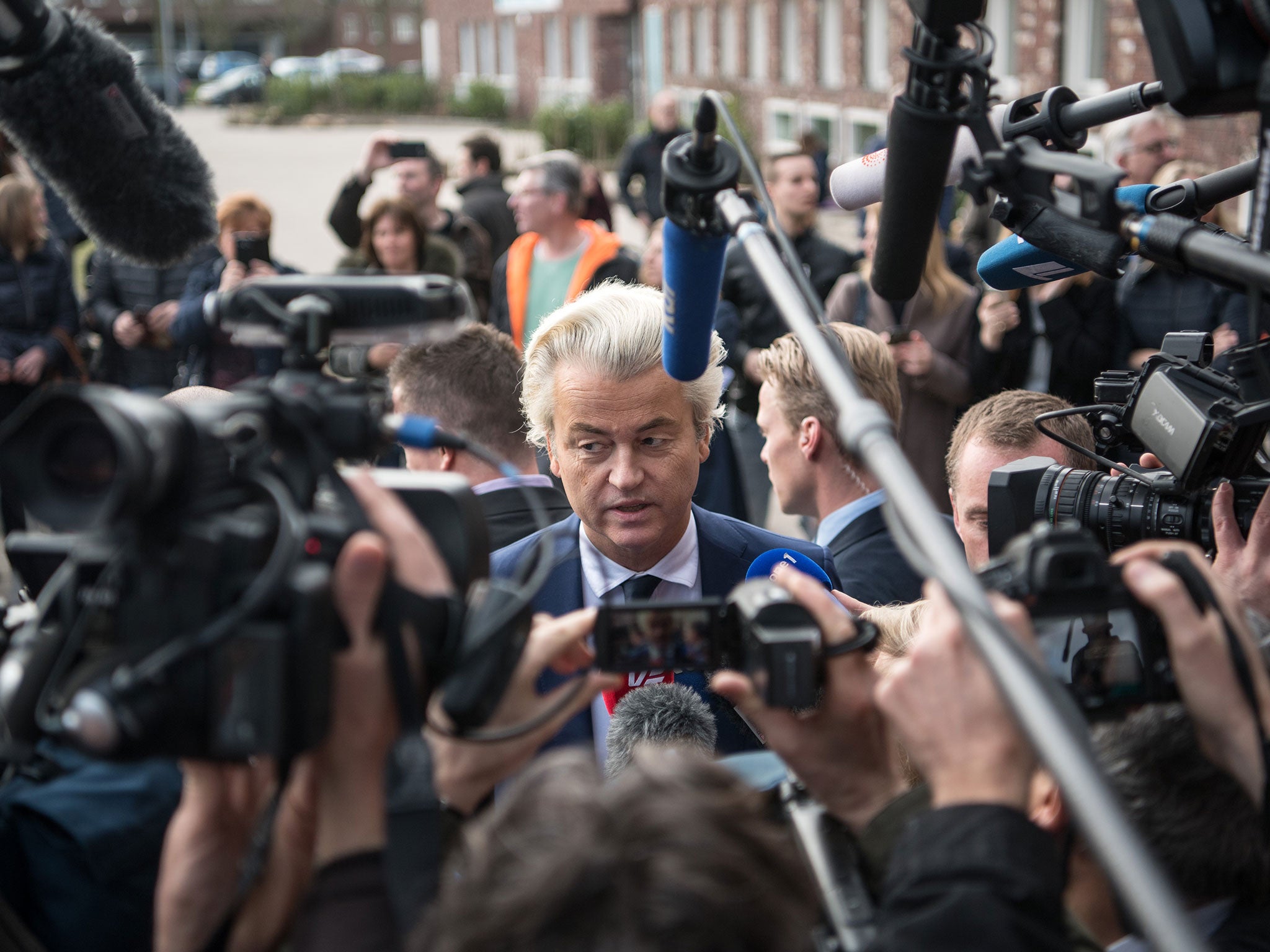'I fear for the future': Voting in Dutch election enters final hours
Polling is close, with far-right firebrand Geert Wilders expecting to lead 'one of the biggest parties'

Jeanette de Jong, a 63-year-old housewife in the west of The Hague, has been a loyal PVV voter ever since Geert Wilders started his own party back in 2006. “I think he makes good points,” she says. Not just on refugees, but also on the need for more money for healthcare. And she says that money now going to aid should be spent on Dutch people who live off food stamps.
She knows Mr Wilders is unlikely to become Prime Minister; almost all other parties have ruled out the option of forming a governing coalition with the PVV. “For me it’s a statement, we have to let them feel what people really think.” A large demonstration by Turkish Dutch over the weekend, following a diplomatic spat with Turkey, intensified her resolve. “That was the final push,” she said.
The fact that Mr Wilders would be unlikely to rule, even if he beats pollsters' expectations and comes out on top, is “undemocratic” in her eyes. But it’s the reason her husband, Marinus de Jong, who is 70, chose to vote for the Christian Democrats. “Wilders doesn’t have any chance of governing anyway. So I wanted to support a right-wing party, to make sure the left doesn’t win,” he told The Independent. “If they do, I fear for the future.”
Across town, a long line of voters snaked outside the polling station inside the picturesque Binnenhof, the seat of the Dutch parliament. Imane Mourabit, 19, was casting her first vote ever. As a Dutch-Moroccan who chooses to wear a veil, she had been personally affected by the rhetoric of this campaign, particularly Mr Wilders' call for criminals with dual nationalities to be expelled from the country.
"I was born here," she says. "That is why I get annoyed when people say, when you do something wrong you should be sent back to your country... It's really strange to tell people to go back to their country because this is where I grew up, this is where I belong." She feels the focus on immigration is crowding out issues that actually matter, like climate change. Because of that, she was voting for the Green Left party, GroenLinks.
Dutch voters have never been so divided. Twenty-eight parties are competing for 150 seats. The difference between the front runners is minimal. The last pre-election figures from Dutch pollster Maurice de Hond predicted that Prime Minister Mark Rutte’s VVD will win 27 and Wilders’ PVV is expected to win 24. The Christian Democrats were not far behind at 22.
After voting at a school in a suburb of The Hague, Mr Wilders already seemed to be tempering expectations. "I expect to be one of the biggest parties,” he said. He emphasised that he had already made his mark on this election, and the country. "Whatever the outcome of the election today, the genie will not go back into the bottle. And this patriotic revolution, whether today or tomorrow, will stay.”
Mr Rutte voted at a school in a middle-class neighbourhood of The Hague. He repeated his warning that “this is a chance for a big democracy like The Netherlands to make a point ... to stop this ... domino effect of the wrong sort of populism." Mr Rutte has emphasised in the last few days that the risk of Mr Wilders’ party emerging as the largest is real.
But the crowded field left many uncertain; almost 40 per cent were still drifting between parties yesterday. The Independent spoke to several people who were unsure whom to cast their vote for, despite being minutes away from casting their ballot.

A final debate which saw the leaders of the top eight parties face off in a series of one-on-one debates drew a record 3.3 million viewers, almost twice as much as in 2012.
Many voters The Independent spoke to emphasised the importance of this election. Turnout has been high. Halfway through voting, turnout was six per cent higher than during the last elections of 2012. Five years ago, 74.6 per cent of roughly 13 million eligible voters showed up to vote.
Join our commenting forum
Join thought-provoking conversations, follow other Independent readers and see their replies
Comments
Bookmark popover
Removed from bookmarks